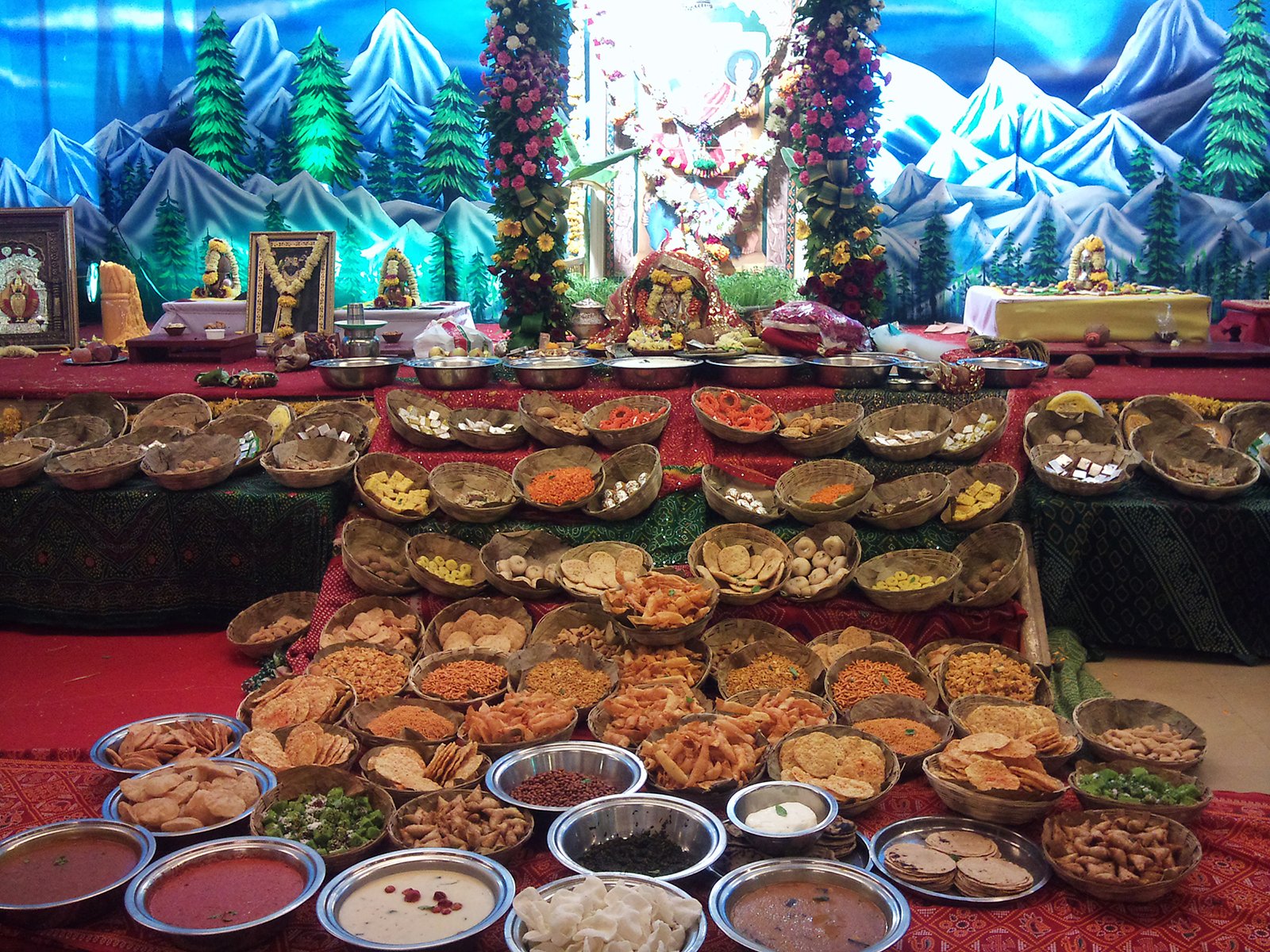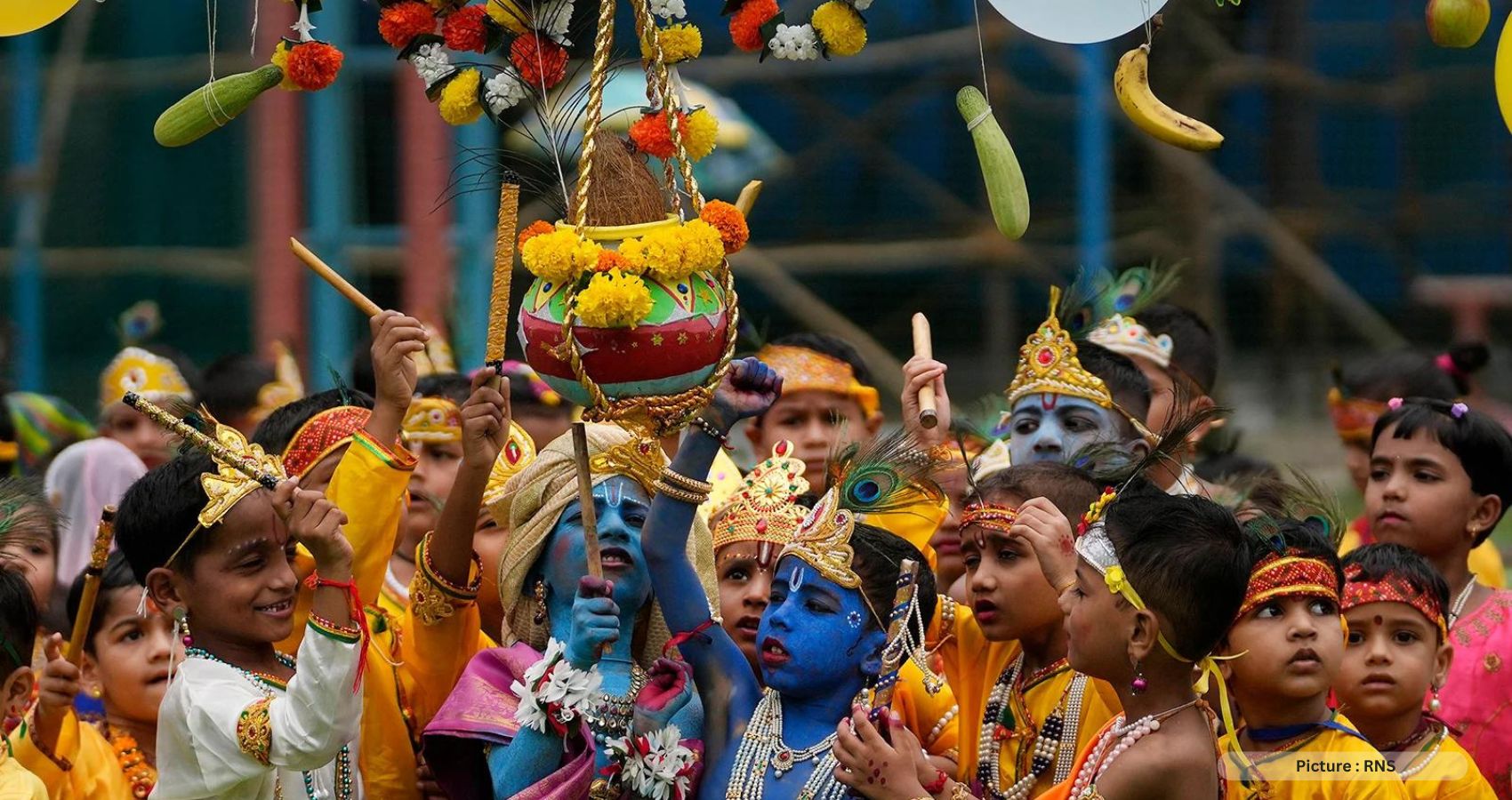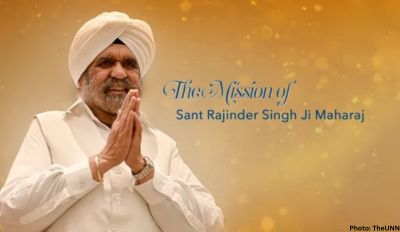(RNS) — It is said in the Hindu scriptures that the blue-skinned Lord Krishna was a sweet yet mischievous child who would steal handfuls of fresh, sweetened butter from his cow-herding neighbors.
It follows, then, that celebrations of Krishna’s birth, or Janmashtami, include an abundance of food. At midnight Wednesday (Sept. 6), Bhakti yogis, or devotees of Krishna, broke their daylong fast together by welcoming Bal Gopal, or baby Krishna, to the world with his 56 favorite foods. This ritual of Chhappan Bhog, an originally North Indian ritual, includes a specially arranged platter of mouthwatering vegetarian dishes, many of them milk-based. 56 meals represent Krishna’s eight meals a day multiplied by the seven days he is said to have lifted the Govardhan mountain.In addition to feeding the incarnate of Vishnu, International Society for Krishna Consciousness temples around the world doubled up their Chhappan Bhog practice with a community food offering. Home-cooked meals from devotees will be offered to the Krishna and his consort, Radha, before donation — so long as they do not contain mushrooms, canned or frozen vegetables or fruits or store-bought preparations.
These offerings must be satvik: strictly vegetarian, and without any onions or garlic. While individual Hindus may differ on their definitions of vegetarianism, such as whether or not sulfur-rich bulbs or root vegetables are permissible, pure vegetarian food is considered the most sacred by many, and is thus commonly used in the ritual of naivedyam, or food offering.
Not all Hindus are vegetarians. Even still, animals are revered by many Hindus for their loyal hearts — especially the cow, who offers nourishment in the form of milk, butter and ghee.
“The food we eat can have an impact on our spiritual development,” said Anuttama Dasa, the director of international communications for ISKCON. “If I cause pain to another living entity for my own selfish needs, then I will accrue bad karma.”
ISKCON, which was started under a tree in New York City’s Tompkins Square Park in 1965, is considered a sect under the vast umbrella of Vaishnavism, the Hindu denomination dedicated to Vishnu and his avatars. Often recognized for adherents’ street-side chanting and singing, ISKCON now boasts more than a million followers worldwide, upward of 600 temples with free Sunday dinners and one of the world’s largest vegetarian relief programs.
Tulasi Srinivas, an anthropology professor at Emerson College and the daughter of Rukmini Srinivas, a famous chef and cookbook author, points to the highly aesthetic and complex meals prepared daily by Vaishnavites around India — including the tradition in Udupi of cooking 108 dishes daily for Krishna — as examples of the intricate web of food-based rituals within Hinduism.
“The myths around Krishna are of luxury,” said Srinivas. “If you offer 56 dishes, it’s a return of blessings a thousandfold.” For Hindus worldwide, cooking healthy and seasonal food is often seen as an act of bhakti, or devotion, in itself. Practitioners show daily reverence to God by first offering their food to deities, then only consuming it after it has been sanctified and turned into prasadam.
“The (Hindu) relationship to food is a relationship of abundance,” said Srinivas. “The more you offer, the more you get back.”
For Janmashtami at ISKCON, practitioners who cook and bring offerings to the temples must follow the sect’s four regulative principles: truthfulness, cleanliness, compassion and austerity.

Dasa says the sect is rooted in the belief that the ultimate goal for human beings is to reawaken their original, eternal connections with God — whom they believe has sent messengers and prophets to earth over time and across cultures, including Krishna, Jesus Christ and Buddha.
“No matter how much money we get, or how beautiful we are, or how famous we become, we will never be satisfied,” said Dasa, whose name was given to him from the founder of ISKCON, A.C. Bhaktivedanta Swami Prabhupada. “We are spiritual beings in the material world.”
Dasa says that fasting, a tenet of many religions, allows for the mind to be pacified and the body to be centered during auspicious days like Janmashtami. Coupled with the repetitive mantra meditation of “Hare Krishna,” many ISKCON devotees say this practice can deliver the mind from materialistic thinking and closer to a direct line of communication with God.
“It’s not the easiest thing in the world to do,” said Dasa about fasting. “But it’s nice to be able to say, this is a special day for slowing down and thinking about what’s important — our relationship with God.”
Whether Hindus are fasting or enjoying an abundance of food, many Hindu food rituals tie back to the ancient wisdom of Ayurveda—a philosophy that dictates that the food we eat influences the way we feel.
India has the highest percentage of vegetarians in the world, largely due to its majority Hindu population. And according to a recent Pew Research study, 51% of Hindus in India and an even larger percentage of Jains said they would never eat food in the home of someone whose religion has different rules about food than theirs.
However, Srinivas says the plurality of Indian food transcends the borders of Hindu dietary restrictions. “Every 100 miles is a different taste, different culture, different tribe, different set of dishes,” said Srinivas. “In the best, all-inclusive plurality of Hinduism, we get these variations. That is part of the beauty of India. And that comes through in the cuisine.”
As Janmashtami is known as the most joyous occasion of the year to followers of ISKCON, devotees were sure to celebrate with singing, dancing and region-specific birthday practices.Also on the menu for Krishna was a large birthday cake — something Dasa says is not necessarily an authentic religious practice, but one that is made with true devotion.
“Spiritual awakening doesn’t have to be difficult,” he said. “It’s actually very pleasurable. We just adjust our lives a little bit to bring Krishna into the picture.”











